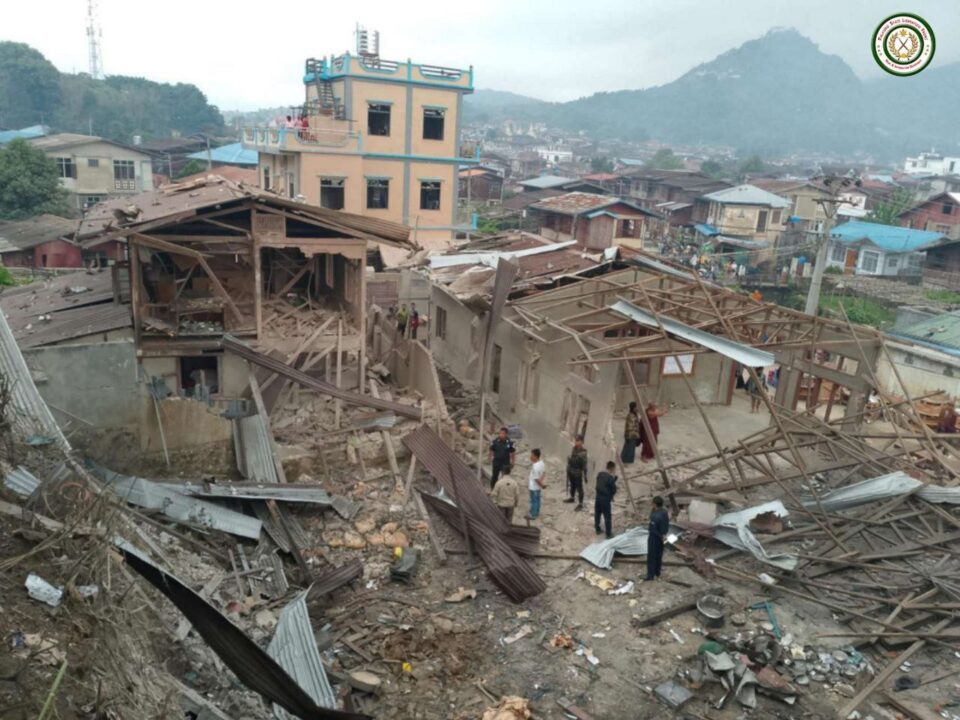BANGKOK – A month after a deadly earthquake triggered the collapse of a high-rise construction site in Bangkok, labor rights groups say the disaster has exposed long-standing flaws in Thailand’s construction sector – particularly its failure to protect the migrant workers who keep it running.
On the day of the quake, more than 100 workers were inside a 32-story unfinished tower when tremors from a 7.7-magnitude earthquake in neighboring Myanmar shook the Thai capital, causing the building to crumble. Many of those trapped were migrant workers from Myanmar, drawn to Thailand by economic hardship and political upheaval.
Migrant workers from Myanmar dominate Thailand’s so-called 3D jobs – dirty, dangerous, and demeaning – with estimates suggesting at least four million now live in the country. Many fled their homeland following the 2021 military coup, seeking safety and opportunity across the border.
Thailand’s construction industry relies heavily on this workforce. In 2023, around 600,000 foreign nationals were employed in the sector, according to the International Labour Organization.
Yet it remains one of the country’s most hazardous industries. A 2022 study by the Workmen’s Compensation Fund found that more than 4,500 workers were killed or injured in construction accidents in 2021 alone – over 40% of them in Bangkok.
The recent collapse has reignited concerns about safety, prompting widespread fear among migrant laborers.
“[Migrant workers] don’t want to work in construction anymore,” said Koreeyor Manuchae, project coordinator at the Migrant Working Group, an advocacy organisation supporting survivors.
“They are afraid of that, but they have no choice.”
Despite their fears, many survivors find themselves unable to leave their jobs. Under Thailand’s bilateral memorandum of understanding system, migrants from Myanmar are bound to their original employers and face significant restrictions if they try to change jobs.
Critics argue that such a system is not only time-consuming, but also can financially burden job-seekers as they often need to go through brokers to find jobs, leaving many little choice in their placement.
No wages, no compensation
Even as many migrant workers remain in their jobs out of necessity, the structural issues that left them vulnerable in the first place continue to persist.
The Migrant Working Group found that despite legal requirements for documented workers to be enrolled in a social security fund that provides healthcare and accident compensation, many employers fail to register them – leaving workers unprotected when disaster strikes.
Only 59 out of estimated up to 900 migrant workers from S.A. Construction, a company sub-contracted to work on the Bangkok high rise at the time it collapsed, were registered with the social security office, according to the group.
A study from the United Nations Development Programme published in 2023 found that around 38% of the Myanmar migrant workers surveyed in Thailand’s construction industry were undocumented, and 40% of surveyed undocumented construction workers reported they received no benefits, such as sick leave or even one day off a week.
Htoo Chit, executive director of the Foundation for Education and Development, an advocacy group, said many new construction workers who arrive in Thailand are forced to work for sub-contractors for a year or two in the name of “gaining experience,” but these organizations are also rife with labor violations.
“[Subcontractors] always say: ‘We are going to pay when this is finished.’ So the migrants are waiting, but when the construction is finished, the subcontractor manipulates them,” he said.
Employers often claim there is no further obligation to compensate the workers since the project has been completed, he explained.
He added that such practices are common in the construction sector, including the widespread reduction of wages for workers employed under subcontractors.
Similarly, some workers were unable to receive wages in the immediate aftermath of the collapse, Manuchae from Migrant Working Group said.
Under Article 75 of the Thai Labor Protection Act, employers are permitted to suspend operations without paying wages during unforeseen events that halt business activity – leaving collapse victims without income until April 17.
In the weeks that followed, Thailand’s labor ministry did not issue any public statement outlining how it would address the concerns of affected migrant workers.
The Ministry’s permanent secretary, Boonsong Thapchaiyuth, announced that families of workers killed in the collapse would receive between one and two million baht (US$30,175-60,350) in compensation. However, this has not been the case for all victims.
According to Zaw, an employee at the Samut Sakhon-based Labor Rights Foundation, which supports Myanmar migrant workers in Thailand, four injured workers from S.A. Construction have yet to receive any compensation from the Thai government.
He added that the families of 11 workers who died in the collapse have also not received support, as their bodies have not yet been recovered.
“We had discussions with the authorities, but they did not make progress,” said Zaw.
“The labor ministry also had different information about the workers,” he lamented.
The labor ministry has not responded to Radio Free Asia’s request for comment.
Edited by Taejun Kang and Mike Firn.
Pimuk Rakkanam in Bangkok contributed to this report.




